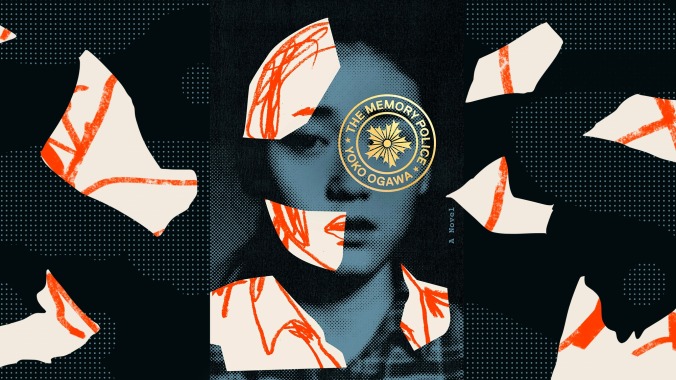Amnesia afflicts an entire island in the urgent, beautiful Memory Police

It starts with tiny things: ribbon, bells, perfume. When the people of an unnamed island in Yōko Ogawa’s The Memory Police lose all memory and appreciation of such objects, they gather to share their fading recollections of whatever has disappeared and physically destroy all trace of it, quickly moving on with their lives. This practice becomes so normal that when their ferry and stamps disappear, cutting the islanders off from the rest of the world, this is accepted, too. Of course, things only get worse from there.
Originally published in Japanese in 1994, The Memory Police shares many stylistic and thematic elements with Ogawa’s 2003 novel, The Housekeeper And The Professor (published in English in 2009), which also explored the terrible price of forgetting; in that story, a brain-damaged mathematics professor’s memory resets every 80 minutes. But while Ogawa’s earlier work was a quiet meditation combining a fable about unlikely friendships with a treatise on the universality of math, The Memory Police feels like a desperate scream for readers to internalize its truths and take action.
Like The Housekeeper And The Professor, The Memory Police is narrated by an unnamed woman and largely refers to characters by informal titles or nicknames rather than proper names. The protagonist is a young novelist whose mother was one of the first victims of the Memory Police, a mysterious organization devoted to removing all traces of things that have disappeared from the island. A big part of that work involves rounding up people who have not forgotten what they’ve lost and try to help others remember. When the narrator learns that her publisher, R, shares the same trait as her mother, she decides to shelter him by building a secret room in her home.
Ogawa’s vagary with names extends to the details of her plot. She never provides a real explanation for the disappearances or the motives of the Memory Police. While there are a few details that ground the story in Ogawa’s native Japan, the sparseness of the narrative makes The Memory Police feel like a fairy tale that could be set anywhere. The book is practically a novelization of German pastor Martin Niemoller’s post-World War II poem “First they came …,” but the environmental effects of the disappearances of things like roses and fruit make Ogawa’s prose feel applicable not just to political atrocities like genocide but to climate change or any other crisis made worse by general complacency.
The narrator’s latest novel, a story of a typist who loses the ability to speak, is woven throughout The Memory Police and develops into a second dark fairy tale. The novel and the novel within the novel complement each other, with the typist story also exploring the crushing power of trauma and urging the oppressed and victimized to keep fighting for themselves and other potential victims while choosing their allies well. Novelists writing about the importance of novels is a literary cliché, and The Memory Police bears a strong resemblance to Peng Shepherd’s The Book Of M, which also deals with a plague of memory loss and the value of preserving books. But Ogawa’s novelist is so humble about her work and her ability to make a difference in the world that the character never feels self-indulgent.
The losses are artfully woven into the prose itself. Birds disappear early in the novel: Those who kept birds as pets release them, and the observatory where the protagonist’s father once studied their migratory patterns is left in ruin. Their absence is keenly felt when the narrator finds some work for R to do to keep himself busy while in hiding. “It’s an excellent idea, killing two creatures with one stone,” she says. Hats are another early disappearance, and when a woman who retains her memories appears wearing “an odd thing made of soft material” on her head, it only adds to her feeling of otherness.
The most tragic scenes in The Memory Police occur when those who are able to remember try to awaken the lost parts of their friends and family. Some who forget are horrified that they and their world are diminishing, but others find the fight too painful and are more content to focus on mundane problems like the snowy weather or the scarcity of good food in the markets. The narrator is primarily concerned for R’s safety, but R is more worried about her soul. It’s a poignant examination about how struggles and people are interconnected and the fact that security is not enough to hope for.
While the island’s hat maker and ferry captain quickly find new livelihoods when their occupations disappear, The Memory Police’s narrator fears what will happen to her should words vanish, leaving her without the ability to fight the disappearances by continuing to create new things. At one point she paraphrases German Jewish poet Heinrich Heine’s line “Where they burn books, they will also ultimately burn people,” but admits she can’t recall who wrote it or why it’s important. Her friend tries to reassure her, saying, “There’s nothing to be done.”